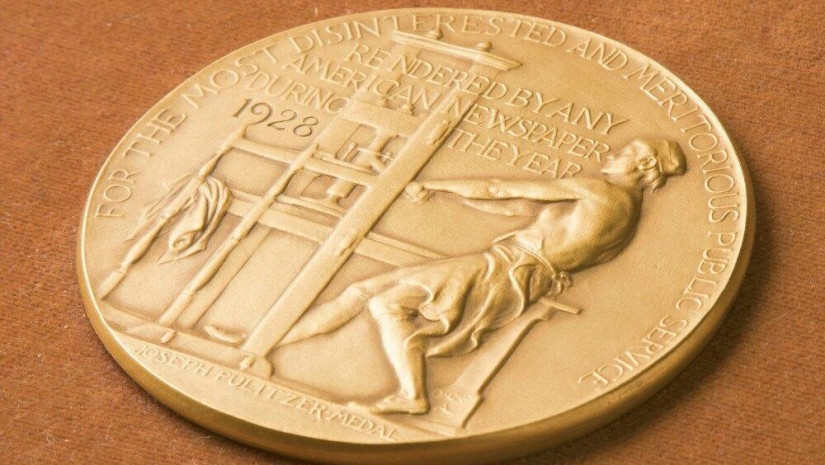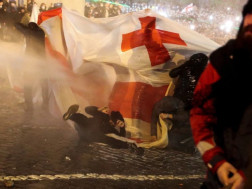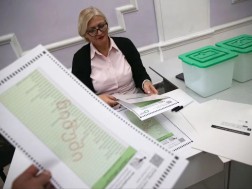The Pulitzer Prizes, usually announced at a ceremony at Columbia University, were announced remotely again this year for the second year in a row due to the coronavirus pandemic.
The Pulitzers are generally regarded as the highest honor that a U.S.-based journalist or organization can receive.
Here are the 2021 Pulitzer Prize winners:
Special Citation
Awarded to Darnella Frazier, for courageously recording the murder of George Floyd.
Breaking News Reporting
Awarded to the staff of The (Minneapolis) Star Tribune for nuanced coverage of the death of George Floyd by Minneapolis police and the reverberations that followed
Finalists
- The staff of The Courier-Journal of Louisville, Kentucky, for coverage that contradicted the police narratives following the killing of Breonna Taylor and the aftermath
- Helen Branswell, Andrew Joseph and the late Sharon Begley of Stat for their prescient coverage of the emergence of COVID-19
Investigative Reporting
Awarded to Matt Rocheleau, Vernal Coleman, Laura Crimaldi, Evan Allen and Brendan McCarthy of The Boston Globe for reporting that uncovered state governments’ systematic failure to share information about dangerous truck drivers
Finalists
- Dake Kang and the staff of The Associated Press for an investigation of China’s state secrecy and fatal consequences in the country’s response to the coronavirus outbreak and human rights abuses against Uyghurs
- Margie Mason and Robin McDowell of The Associated Press for an examination of the abusive practices of international palm oil producers
Explanatory Reporting
Awarded to Ed Yong of The Atlantic for a series of lucid pieces on the COVID-19 pandemic that anticipated the course of the disease, synthesized complex challenges, illuminated the U.S. government’s failures and provided clear context for the challenges it posed
Awarded to Andrew Chung, Lawrence Hurley, Andrea Januta, Jaimi Dowdell and Jackie Botts of Reuters for an exhaustive examination, powered by data analysis of U.S. federal court cases, of the legal doctrine of “qualified immunity” and how it shields police who use excessive force from prosecution
Local Reporting
Awarded to Kathleen McGrory and Neil Bedi of the Tampa Bay Times for resourceful reporting that exposed how a powerful and politically connected sheriff built a secretive intelligence operation that used grades and welfare records to profile schoolchildren
Finalists
- Jack Dolan and Brittny Mejia of the Los Angeles Times for exposing failures in Los Angeles County’s safety-net healthcare system that led to monthslong wait times for some patients, including some who died before getting appointments
- Staff of The Post and Courier of Charleston, South Carolina, for a look at how water levels in the city were rising faster than previously thought and the social, environmental and regulatory challenges climate change poses
National Reporting
Awarded to the staffs of The Marshall Project, Alabama Media Group, The Indianapolis Star and the Invisible Institute for a yearlong investigation of K-9 units and the damage that police dogs inflict on Americans
Finalists
- Staff of The New York Times for detailed reporting on how the Trump administration repeatedly failed to respond to the coronavirus threat, including downplaying its seriousness
- Staff of The Wall Street Journal for a series of stories documenting how nursing home residents were hit particularly hard by the coronavirus pandemic partially due to improper decisions from government officials
International Reporting
Awarded to Megha Rajagopalan, Alison Killing and Christo Buschek of BuzzFeed News for a series of stories that used satellite imagery, architectural expertise and interviews with two dozen former prisoners to identify a vast new infrastructure built by the Chinese government for the mass detention of Muslims
Finalists
- Staffs of BuzzFeed News and the International Consortium of Investigative Journalists for a massive reporting project that led to revelations about the ongoing role of some of the world’s biggest banks in facilitating international money laundering and trafficking of goods and people
- Staff of The New York Times for a masterful synthesis of stellar writing, powerful images and engaging interactives that illustrated how the world was unprepared for a fast-moving pandemic
- Staff of The Wall Street Journal for an authoritative and deeply reported portrait of Xi Jinping and his increasingly authoritarian control of the state, economy and politics
Feature Writing
Awarded to Nadja Drost, freelance contributor to The California Sunday Magazine, for a gripping account of global migration that documents a group’s journey on foot through the Darién Gap, one of the most dangerous migrant routes in the world
Awarded to Mitchell S. Jackson, freelance contributor to Runner’s World, for a deeply affecting account of the killing of Ahmaud Arbery that combined vivid writing, thorough reporting and personal experience to shed light on systemic racism in America
Finalist
- Greg Jaffe and The Washington Post for deeply reported stories that powerfully depict the suffering endured by Americans who lost their jobs after the collapse of South Florida’s tourist economy in the pandemic
Commentary
Awarded to Michael Paul Williams of the Richmond (Virginia) Times-Dispatch for penetrating and historically insightful columns that led Richmond, a former capital of the Confederacy, through the painful and complicated process of dismantling the city’s monuments to white supremacy
Finalists
- Melinda Henneberger of The Kansas City Star for tenacious and deeply reported columns on failures in the criminal justice system
- Roy S. Johnson of Alabama Media Group for evocative columns on race and remembrance written with style, urgency and moral clarity
Criticism
Awarded to Wesley Morris of The New York Times for unrelentingly relevant and deeply engaged criticism on the intersection of race and culture in America, written in a singular style, alternatively playful and profound
Finalists
- Craig Jenkins of New York magazine for writing on a range of popular topics, including social media, music and comedy, that contending with the year’s disarray and exploring how culture and conversation can flourish and break down online
- Mark Swed of the Los Angeles Times for a series of essays that broke through the silence of the pandemic to recommend an eclectic array of recordings as entertainment and solace essential to the moment
Editorial Writing
Awarded to Robert Greene of the Los Angeles Times for editorials on policing, bail reform, prisons and mental health that clearly and holistically examined the Los Angeles criminal justice system
Finalists
- Lee Hockstader of The Washington Post for a series of editorials that pushed for accountability in the shooting and killing of an unarmed man by U.S. Park Police.
- Alan Wirzbicki and Rachelle G. Cohen of The Boston Globe for editorials that addressed a controversial local zoning fight that centered on the legacy of restrictive housing laws.
Editorial Cartoons
No prizes were awarded in this category
Finalists
- Lalo Alcaraz of Andrews McMeel Syndicate for cartoons drawn from an unabashedly specific Latino point of view that target the hearts and consciences of Americans
- Ken Fisher, drawing as Ruben Bolling, for “Tom the Dancing Bug,” part of Andrews McMeel Syndicate, for an effective example of the alternative cartooning form that uses multiple panels to create a satirical take on policial issues
- Marty Two Bulls Sr., freelance cartoonist, for innovative and insightful cartoons that offer a Native American perspective on news events
Breaking News Photography
Awarded to photography staff of The Associated Press for a collection of photographs from multiple U.S. cities that cohesively captures the country’s response to the death of George Floyd
Finalists
- Hassan Ammar, Hussein Malla and Felipe Dana of The Associated Press for a series of images that documented the uncertainty and devastation following a blast that rocked Beirut
- Joshua Irwandi, freelance photographer, National Geographic, for a haunting photograph of a coronavirus victim in an Indonesian hospital who was wrapped in plastic and awaiting a body bag
Feature Photography
Awarded to Emilio Morenatti of The Associated Press for a poignant series of photographs that takes viewers into the lives of the elderly in Spain struggling during the pandemic
Finalists
- Staff of Getty Images for thorough coverage of the global impact of the pandemic
- Tyler Hicks of The New York Times for searing images that capture the toll of the coronavirus deep in Brazil’s Amazon and how it ravaged the region’s Indigenous people
Audio Reporting
Awarded to Lisa Hagen, Chris Haxel, Graham Smith and Robert Little of NPR for an investigative series on no-compromise gun rights activists that illuminated the deepening schism between American conservatives
Finalists
- Staffs of the Invisible Institute, The Intercept and Topic Studios for “Somebody,” a dogged and searing investigation of the murder of a young Black man in Chicago
- Staff of NPR for courageous, on-the-ground reporting on the assassination of Iranian General Qassem Soleimani and its implications around the globe
Public Service Reporting
Awarded to The New York Times for courageous, prescient and sweeping coverage of the coronavirus pandemic that exposed racial and economic inequities, government failures in the U.S. and beyond, and filled a data vacuum that helped local governments, health care providers, businesses and individuals to be better prepared and protected.
Finalists
- The Courier-Journal of Louisville, Kentucky, for comprehensive coverage of the police killing of Breonna Taylor and systemic racism in the police force
- ProPublica for insightful coverage of the coronavirus pandemic
















